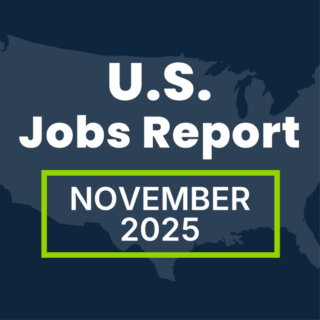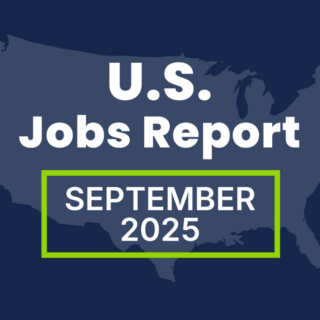The September Labour Market Report released by the Office for National Statistics, which includes the three months from May 2019 through July 2019, reported that 31,000 jobs were created as the unemployment rate fell slightly to 3.8%. Nominal wages showed an annual increase of 3.8%.

Notable figures from the September report include:
- The UK employment rate was estimated at 76.1% and is tied for the highest rate on record since records began in 1971.
- The number of job vacancies fell to 812,000, the lowest level since the end of 2017.
- The annual wage increase including bonuses jumped to 4.0%.
Modest Job Gains and Decreased Vacancies Point to Slowing Growth
Jobs continued to grow in the UK over the quarter, but the growth was at a tepid pace. Since the report covering the same quarter last year, which showed only 3,000 job gains, 369,000 jobs have been added. At the same time, the number of job vacancies is dropping steadily.
John Philpott, the director of the Jobs Economist consultancy, noted that private-sector job creation was at a “near standstill.” Only 2,000 of the 31,000 jobs created over the quarter came from the private sector.
“These latest figures confirm recent signs of softening in the UK labour market. Recruitment appears to have weakened most noticeably in smaller private sector businesses, though it is unclear to what extent this reflects prolonged uncertainty over Brexit or a broader slowdown in the economy,” Philpott said.
While economic growth appears to be slowing in many developed economies, including the UK, there were numbers released in the report which point to Brexit’s impact. Manufacturing is a sector that is among the most vulnerable to trade uncertainty and disruption. During the same quarter last year, manufacturing in the UK produced 23,000 new jobs and grew at an annual rate of 1.2%. This year, manufacturing shed 5,000 jobs during the quarter with a 0% annual growth rate.
Employers Postpone Hiring But for How Long?
A survey released by KPMG and The Recruitment and Employment Federation showed that the number of workers hired for permanent jobs through recruitment agencies decreased at the fastest pace in more than three years in August.
The survey showed that temporary hiring rose at its slowest pace in 75 months. Permanent placements fell for the sixth month in a row as employers postponed hiring. “Brexit uncertainty continues to take its toll on the jobs market,” James Stewart, vice chair at KPMG, said.
With a resolution to the Brexit crisis nowhere in sight, it is unclear how long employers will continue to be cautious about hiring. The UK economy has already withstood Brexit deadlines and job growth has continued. However, the October 31 deadline comes in the wake of a political crisis and the shutdown of Parliament. It remains to be seen how employers will respond to continued uncertainty or after some level of resolution takes place in the coming weeks.
It is Still a Job Seeker’s Market
With the backdrop of a shuttered Parliament and dire warnings about a recession resulting from a “no-deal Brexit,” the September report still showed a labour market that was growing, albeit slowly, with decades low unemployment and a record-high number of people working. The healthy wage increases are a result of a market with strong demand for talent. Even the level of job vacancies, while lower than in recent years, is by no means negligible.
While many employers appear to be scaling back hiring, they are doing so during a tight labour market. Given the potential for shifting market conditions, having a sound, flexible, recruitment and retention strategy for UK enterprises will be a key factor in their success in the uncertain months ahead.




